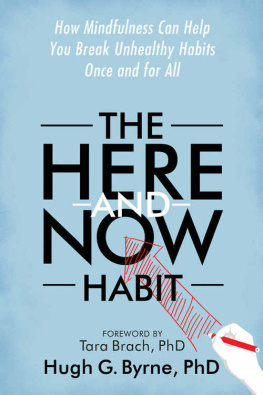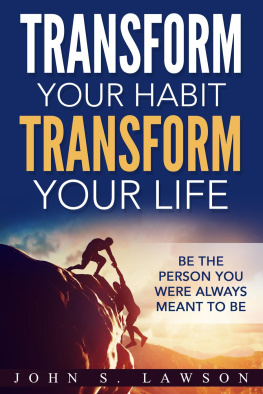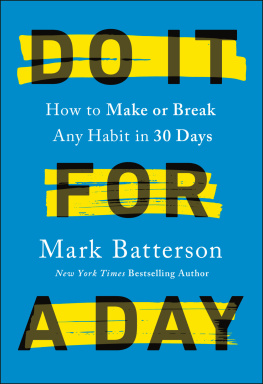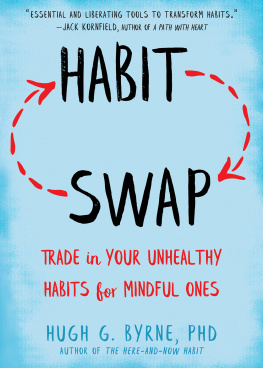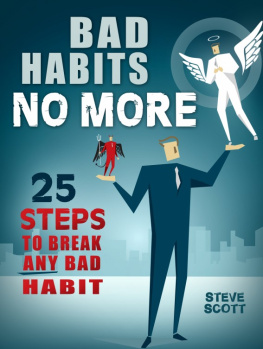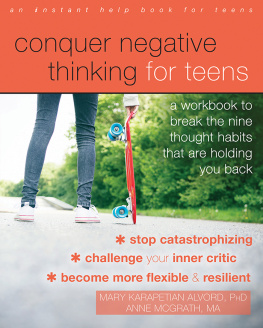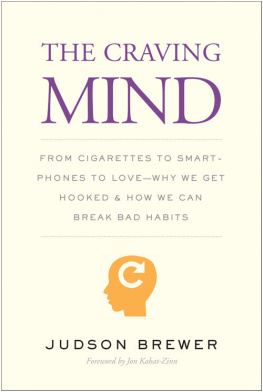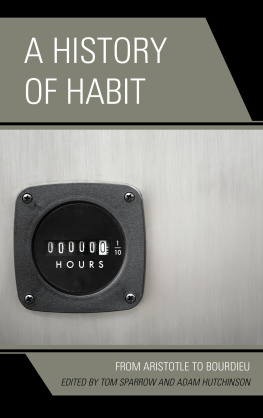A wonderful thing about TheHere-and-Now Habit is that it not only tells you that you can change, it tells you how to actually do it. Hugh G. Byrne brings together contemporary science, ancient teachings, and his own experience to help his readers learn to suffer less by changing unskillful habitswhat a generous gift!
Sharon Salzberg, author of Lovingkindness and Real Happiness
Practical and profound, this book shows how to use modern neuroscience combined with ancient wisdom to end harmful habits and grow helpful ones. With brief, doable exercises, hopeful perspectives, concrete examples, and friendly support, Hugh G. Byrne offers both freedom from old stuckness and the cultivation of a strong and happy heart.
Rick Hanson, PhD, author of Buddhas Brain
What you will appreciate in this simple yet profound book is that all of life is habit. Just as we have developed habits over time, we can exchange, improve, and transform habits through understanding and mindfulness practices. This refreshing read offers guidance that nurtures our capacity to be present, and to cultivate a quality of awareness crucial to transcending habitual reactivity, conflict, and harm. A must-read for those willing to witness their lives and deepen their personal and relational well-being.
Ruth King, author of Healing Rage and Mindful of Race
Hugh G. Byrnes book, TheHere-and-Now Habit, is one of the best books I know on learning how to apply mindfulness to our everyday life. There are many books on mindfulness. The unique thing about Byrnes book is that he clarifies the meeting place of mindfulness and the formation of habits. This is the book I would recommend for those who want to use mindfulness to change unhealthy habits and create healthier ones.
Loch Kelly, author of Shift into Freedom
If you want to change your habits and become happier and more free, try the practical mindfulness and wise instruction of TheHere-and-Now Habit.
Jack Kornfield, author of A Path with Heart
TheHere-and-Now Habit weaves together the rigor of science and the wisdom of mindfulness to support the cultivation of healthy habits and the release of unskillful ones. Hugh G. Byrne draws on decades of personal meditation practice to offer us an illuminating work that welcomes a new way of living that has the power to transform our individual and collective lives.
Shauna Shapiro, PhD, coauthor of The Art and Science of Mindfulness

Publishers Note
This publication is designed to provide accurate and authoritative information in regard to the subject matter covered. It is sold with the understanding that the publisher is not engaged in rendering psychological, financial, legal, or other professional services. If expert assistance or counseling is needed, the services of a competent professional should be sought.
Excerpt from Peace Is This Moment Without Judgment by Dorothy Hunt. Copyright Dorothy Hunt. Text of Clearing by Martha Postlewaite. Copyright Martha Postlewaite. Used by permission of the authors.
Excerpt from Kindness from WORDS UNDER THE WORDS: SELECTED POEMS by Naomi Shihab Nye. Copyright 1995 Naomi Shihab Nye / Far Corner Books. Used by permission of the author.
The Guest House from THE ESSENTIAL RUMI by Jalal al-Din Rumi, translated by Coleman Barks. Copyright 1997 by Coleman Barks. Used by permission of Coleman Barks.
Distributed in Canada by Raincoast Books
Copyright 2016 by Hugh G. Byrne
New Harbinger Publications, Inc.
5674 Shattuck Avenue
Oakland, CA 94609
www.newharbinger.com
Cover design by Amy Shoup
Acquired by Wendy Millstine
Edited by Will DeRooy
All Rights Reserved
Library of Congress Cataloging-in-Publication Data
Names: Byrne, Hugh G., author.
Title: The here-and-now habit : how mindfulness can help you break unhealthy habits once and for all / Hugh G. Byrne ; foreword by Tara Brach.
Description: Oakland, CA : New Harbinger Publications, 2016. | Includes bibliographical references.
Identifiers: LCCN 2015049024 (print) | LCCN 2016001327 (ebook) | ISBN 9781626252370 (paperback) | ISBN 9781626252387 (pdf e-book) | ISBN 9781626252394 (epub) | ISBN 9781626252387 (PDF e-book) | ISBN 9781626252394 (ePub)
Subjects: LCSH: Self-actualization (Psychology) | Mindfulness (Psychology) | Habit breaking. | Self-control. | BISAC: SELF-HELP / Personal Growth / General. | BODY, MIND & SPIRIT / Meditation. | SELF-HELP / Substance Abuse & Addictions / General.
Classification: LCC BF637.S4 B967 2016 (print) | LCC BF637.S4 (ebook) | DDC 158.1--dc23
LC record available at http://lccn.loc.gov/2015049024
To my mother,
Kathleen Byrne,
with
love and gratitude
Contents
Tara Brach, PhDAuthor, Radical Acceptance and True Refuge
I was in college, in the midst of final exams, when I first heard the phrase How you live today is how you live your life. My mind immediately fixated on my exhaustion after pulling an all-nighter to study, the fact that I hadnt taken a run for a week, and judgmental thoughts surrounding a recent ice cream binge. The notion that these habits reflected my life was disturbing. Yet, over time, what at first seemed jarring and oppressive became empowering. The shift came in realizing that today, right in this very moment, we can deepen our attention and cultivate habits that support healing and freedom.
Our habitshow we think, speak, feel, and actdirectly impact our well-being. More broadly, they reinforce patterns that shape our entire experience of living. Our habits determine whether we are available to listen when our child is trying to communicate and how well we can take care of our own bodies and minds as we age. Our habits determine whether we bring our full intelligence to what we do and whether we are able to enjoy the beauty and mystery of the moment. If we want to live a life in which we are true to ourselves, remembering what matters most to us and expressing our natural creativity and love, we need to honestly examine our current habits.
Habits are like the streams that create riverbeds: with a steady flow of water, channels become deep grooves. And yet, if the flow is redirected, rivers can be rerouted. Neuroplasticity makes this possible: the pathways in our brainincluding the riverbeds of habits that affect our well-beingcan be altered depending on how we direct our attention. Where attention goes, energy flows. A mindful awareness is essential in guiding the flow in ways that will help us realize our full potential.
Buddhist teachings, contemporary psychology, and recent findings in neuroscience all converge on a simple principle: By bringing mindful attention to our habits of thought, feeling, speech, and action, we can transform even the most painful and limiting patterns. In order to make changes, we need to witness our habits with an engaged, nonjudging presence and a tender, caring heart.
From an evolutionary perspective, the capacity for mindfulness is a recent development; it emergedalong with empathy, compassion, and executive thinking skillswith the growth of our brains frontal cortex. Without mindfulness, our habits would be entirely driven by the primitive energies of attraction (desire) and aversion (fear). Mindfulness enables us to evolve our consciousness and influence our subsequent life experience by bringing awareness to the habits that keep us from achieving our potential. With mindfulness, we can identify the impulses behind our automatic and reactive behaviors and see the way they impact our lives and the people around us. With mindfulness, we can cultivate habits that will help us fulfill our hearts deepest intentions.
Next page
